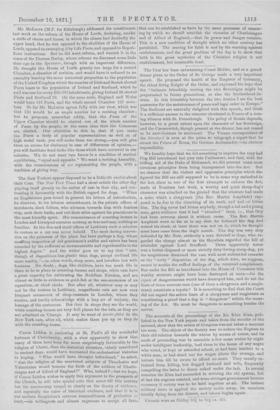We humbly hope that we did something to improve the
very bad Dog Bill introduced last year into Parliament, and that, with the trifling aid of the Duke of Richmond, we did prevent some most atrocious principles from being incorporated into the Act. But we observe that the violent and oppressive principles which dis- figured the Bill are still supposed to be in some way embodied in the Act, since in one of the first attempts to enforce the Act, made at Evesham last week, a worthy and quiet sheep-dog's character was attacked on the ground that the creature had made a noise which a clergyman (the Rev. Martin Amphlett) sup- posed to be due to the clenching of its teeth, and had not bitten him. The dog never had bitten anybody, though a lad and a young man, gave evidence that it had " attacked " them, i.e., that they had been nervous about it without cause. The Rev. Martin Amphlett went so far as to say that he believed the dog had wetted his cloak, at least there was wet on it, which he thought must have come from the dog's mouth. The dog was very ably defended by Mr. New, evidently a man devoted to dogs, who re- garded the charge almost as the Royalists regarded the bill of attainder against Lord Strafford. There apparently never was a better-disposed or more strictly duty-loving sheep-dog, yet the magistrates dismissed the case with most unfounded remarks on the " surly " disposition of the dog, which were, we suppose, meant to soothe the ruffled feelings of the reverend complainant. But under the Bill as introduced into the House of Commons this worthy creature might have been destroyed at once,—for the repute of dangerousness would have destroyed him, and do not the fears of three nervous men (one of them a clergyman and a magis- trate) constitute a repute ? It is something to find that the Court did not regard the active fears of a clergyman and magistrate as constituting a proof that a dog is " dangerous " within the mean- ing of the Act. He must be dangerous to something besides the nerves.










































 Previous page
Previous page